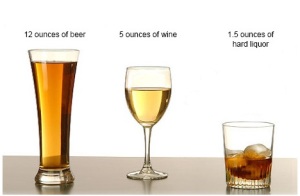Duh, it is illegal to consume alcohol if you are under the age of 21. Regardless of what U.S. law states, many college students participate in liquid recreation.
A student’s relationship with alcohol can vary greatly depending on one’s knowledge of the matter. In an attempt to create a more aware student body, the USF Counseling and Psychological Services (CAPS) department held a Truth About Alcohol meeting last Thursday.
According to Michelle Montagno, the program administrative coordinator for CAPS, is that ages 18-25 are most vulnerable to alcohol abuse. One in 10 Americans has a drinking problem, she said, and for many, that problem begins with college binge drinking.
The largest proportion of binge drinkers, which is defined as those who intake excessive amounts of alcohol in a short period of time, are college-aged, as reported by the Center for Disease Control. The consequences for excessive drinking include memory loss, vomiting, headaches, blackouts, depression, and addiction. While USF requires freshman to complete a My Student Body online alcohol education program during orientation, binge drinking is still present around campus.
“I have definitely seen people vomiting and passing out a ton. I’ve seen people at parties who have been foaming at the mouth and had to have an ambulance called for them,” said Michelle Bottarini, a senior nursing student.
Similarly, Joseph Emde, a front desk worker for Gilson Hall last year, walked into the men’s bathroom to find a girl passed out on the floor, in her own vomit. “She had to go to the hospital. She was never able to look me in the eyes again,” he said.
Despite these scenes, there are students who find educational awareness pointless. Ben Miller, a junior business major, took an online alcohol course after being written up for dorm room drinking his freshman year, and was less than inspired. “These meetings are meant for people with drinking problems, and the vast majority of people they are reaching don’t have drinking problems,” he said.
Others share his belief. Omar Avalos, a junior multicultural marketing student, agreed that alcohol education events hold little effect. “If the students are already drinking, then they know what they’re getting themselves into,” he said.
For students who don’t drink, however, alcohol education seems to be more beneficial. “It helps those kids who have no experience drinking. Especially since we will encounter situations with alcohol, and we will need to know what to do if the situation arises,” said freshman Myles Oliver. And, as it appears, there is a good chance that the situation will arise.
Miller recalled his sophomore year of high school when his friend, in attempt to keep up with the rest of the boys, drank more than he was used to. “He passed out and his body went full white. In hindsight, we should have taken him to the hospital, but we didn’t because we didn’t want to get in trouble,” he said.
Montagno made note in her lecture that one can be held legally liable for failing to help a friend with alcohol poisoning. The problem is that many students are not aware of when their friends are in need. The idea is simple but often forgotten: “alcohol poisoning is life threatening,” explained Montagno. “People think it’s funny that this guy got drunk at a party and passed out, but then he doesn’t wake up in the morning.”
If you notice signs of alcohol poisoning, which include having pale or blue-ish skin, low body temperature, slow or shallow breathing, and an inability to wake up from sleep, get help. Call 911 or USF Public Safety at 415-422-2911.

Everything in moderation: All measurements are based on a per-hour rate with a glass of water in between each drink.


